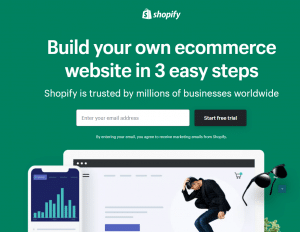5 Best Ecommerce Platforms for Complete Beginners in 2025

The appropriate e-commerce software is crucial for initiating an online business or enhancing your digital sales reach. With a wide range of options tailored for various business sizes and types, making the right choice can be arduous. Nevertheless, despite each platform's distinct features, finding the perfect one for your company is feasible.
To help you navigate through the options, we have curated a list of the best ecommerce platforms suitable for small businesses in this article.
Related Reading: The Ultimate Guide to Starting Your Ecommerce Business
Choosing the Best Ecommerce Platform for Your Online Store
The new digital landscape has given rise to ecommerce platforms, which enable business owners of all sizes to establish their presence online. With tools like Shopify, Wix, or Squarespace, sellers can break free from the constraints of limited sales on Amazon or eBay and instead create their own ecommerce site that they have full control over.
The only potential problem is the rise of online selling has made it a lucrative and widely adopted method of generating income in the digital era. In this regard, numerous companies compete to provide the most efficient and cost-effective ecommerce platform for small business owners.
Each ecommerce platform has its unique features and target audience. Some cater to small businesses and startups, while others are intended for enterprise-level organizations. Similarly, specific ecommerce platforms are budget-friendly, while others can be costly.
Several factors exist when choosing an ecommerce platform to sell products or services online. Here are some to consider:
- Business size
- Ecommerce platform fees (some may be free but require startup costs)
- Business status (brand new or established)
- Physical store locations, in addition to an online store
- Product types sold
- Target market
- Sales and marketing budget
- Desired level of technical management
- Priorities, such as pricing versus creative control
- Non-negotiable features
- Need for a mobile app for on-the-go business management
- Level of control over the website
We suggest to create a checklist of essential features your ecommerce platform should have and a list of optional features you would like, you can use these lists to narrow your options.
Here are some other factors to consider when choosing an ecommerce platform:
- Speed and performance
- User friendly
- Features
- Design and themes
- Integrations
- Overall Value
5 Best Ecommerce Platforms for Beginners
With that out, let’s look at the best ecommerce platforms options for opening your online store as a small business.
#1Shopify
Nowadays, discussing ecommerce and online sales is nearly impossible without mentioning Shopify. The Shopify website boasts top-notch sales features, robust industry-leading tools, and a vast marketplace of plugins in its app.
Shopify provides a platform for business owners to establish and manage online stores. When customers visit a website hosted by Shopify for any brand, they experience pages that are highly personalized to enhance their shopping experience.
It provides many advanced marketing tools compared to competitors such as Wix and Squarespace, and it also includes a free SSL certificate for security.
You can seamlessly synchronize your inventory and orders across multiple sales channels, such as eBay and Amazon. Also, you can explore new sales strategies, such as dropshipping via plugins.
Pricing : 14-day free trial and $29 monthly for the essential Shopify experience. Advanced Shopify costs $299 monthly. Read more in our article about How Much Does It Cost to Sell on Shopify?
Integrated sales channels: Google, eBay, Amazon, Walmart Marketplace, Facebook, and Instagram.
Mobile app features: Mobile tools for online business management.
Pros
- Free trial available to get started
- Free themes
- Huge amount of plugins to choose from
- Unlimited products on all plans
- Integrated payment options
- Fantastic for all kinds of business plan
- Customer support options
- Shop Pay offers low online transaction fees
- Unlimited bandwidth
- Over 6,000 third-party apps
Cons
- Costly
- The blogging platform is very limited
- Existing sales fee
- Extra features come at an additional cost
Shopify offers a range of marketing tools, including email marketing, abandoned cart recovery, search engine optimization (SEO), and other features, all available free of charge.
Additionally, Shopify has an app which allows you to manage your business from your phone with features like order, adding products, real-time sales and inventory updates, and more.
Here's our ultimate guide on How to Start a Shopify Store in Less Than 10 Minutes.
#2WooCommerce
WooCommerce is an ecommerce solution that has captured the attention of businesses worldwide. It is not only highly accessible and straightforward to use but also built on the WordPress Content Management System. It is the best option for small businesses with an existing WordPress site
WooCommerce, like other WordPress plugins, connects to your WordPress website. The system also includes several excellent official extensions that you can use to make running your website more accessible. You can select advanced themes for your storefront and experiment with dropshipping tools.
WooCommerce has a unique feature in that, unlike many other ecommerce platforms available today, it includes built-in blogging and the ability to accept unlimited orders.
Shopify is very flexible because it is open source, but you will also require much more technical knowledge to get started.
Pricing : Although it is an open-source solution, the usage of WooCommerce is essentially free. However, you must pay for your hosting and payment gateways.
- WooCommerce projects that hosting will cost $120 per year, domain name registration will cost $15 per year, the site theme will cost up to $100 per year, shipping costs will be up to $108 per year, and there will be a fee of 2.9% plus 30 cents per sale. In addition, marketing and communication costs can be up to $348 per year, SEO up to $79 per year, and an SSL certificate up to $65 per year. The average monthly fee is expected to be around $30.
- Free trial length: While no free trial is available, the platform offers a 30-day money-back guarantee.
Integrated sales channels: Google Shopping, Etsy, eBay, Facebook, Amazon, Pinterest, and Walmart; integrations must be more cohesive
Mobile app features: View analytics, add products, and manage orders
Point-of-sale: Native POS available
Pros
- Unlimited products and orders
- Incorporate any additional functionalities that you desire
- Affordable, but requires self-hosting
- Huge selection of themes and customization options
- Unlimited selling allowed
- Built on top of WordPress
Cons
- Requires some technical knowledge
- It needs a third-party payment gateway
WooCommerce is WordPress's best choice for selling online. Initially a blogging platform, it now offers a website builder with WooCommerce integration for online sales.
WooCommerce allows for high customization, particularly with web design and coding skills. To enhance your store's functionality, over 6,000 third-party integrations are available, similar to Shopify.
If you want to get to know the biggest differences between WooCommerce and Shopify, read our article about WooCommerce vs Shopify: Which Platform Is Right for You?
#3BigCommerce
BigCommerce is ideal for small businesses that want to expand and sell across multiple ecommerce platforms. It's a scalable online selling solution for building an online store. Although e-commerce tools offer advanced features and functionality, they may require some time to master.
This ecommerce platform is the best choice for small businesses that have grown into huge corporations or enterprises. You'll have access to numerous features to explore, which means that most of the functionality you need is already integrated into the software.
With BigCommerce, you won't be as dependent on app platforms as Shopify. BigCommerce can help your business expand and reduce costs, regardless of whether you sell on Amazon, Instagram, Square, eBay, Facebook, or Pinterest.
BigCommerce offers various sales features, but you require capable team members to utilize all advantages. Additionally, you can access some fantastic SEO tools that will aid in your website's visibility on Google.
Pricing : BigCommerce provides access to numerous integrated features, making it unnecessary to look elsewhere for most of the functionality you need.
Here are the pricing plans available:
- Standard plan: $29.95 per month
- Plus plan: $79.95 per month, or $71.95 per month if you choose to pay annually
- Pro plan: $299.95 per month, or $269.96 per month if you choose to pay annually
- Enterprise plan: pricing is customized to your specific needs.
- Free trial length: 15 days
Integrated sales channels: Facebook, eBay, Amazon, Price comparisons, Google Shopping, Walmart, Etsy, and Instagram.
Mobile app features: Manage inventory and products, view analytics, customer search, and update orders; some are Android-only
Pros
- In-built visual merchandising tool
- No transaction fees
- Unlimited products, storage, and bandwidth
- Product rating and review options
- Many free apps are available to choose from
- Excellent for selling across multiple channels
- 24/7 tech support by phone, email, or chat
- Affordable payment processing rates
Cons
- Less easy to set up than some tools
- Limited free themes available
BigCommerce is a powerful and feature-rich ecommerce platform. Small businesses may find BigCommerce overwhelming, but it's good option if you plan to expand or access technical resources.
#4Squarespace
Squarespace offers businesses that crave creative autonomy an exceptional ecommerce platform. This website builder, hosted on the cloud, resembles Wix's appearance but has advanced capabilities, such as top-notch social media integration.
Squarespace is the best option for a do-it-yourself ecommerce website.
If you seek to develop an online business or portfolio emphasizing aesthetics, Squarespace presents a worthy option. You can access numerous sleek and contemporary templates that you can modify anytime. Nonetheless, this tool may not offer as many ecommerce features as Shopify.
On the bright side, any annual plan you choose automatically includes SSL security and a free domain. Additionally, you benefit from a mobile-optimized checkout process and zero transaction fees on any of your plans.
Pricing : Business plans begin at $18 per month, making them a reasonably priced choice. Unfortunately, no free subscription is available.
- Personal: $16 monthly, or $12 monthly when paid yearly
- Business: $26 monthly, or $18 monthly when paid yearly
- Basic Commerce: $30 monthly, or $26 monthly when paid yearly
- Advanced Commerce: $46 monthly, or $40 monthly when paid yearly
- Enterprise pricing is also available
- Free trial length: 14-day free trial is available, and a one-time, seven-day trial extension is possible
Integrated sales channels: Amazon, eBay, Etsy, and Google Actions integrated via Shopping Feed extension.
Mobile app features: Edit website, scan shipping labels, manage orders, track inventory, and communicate with customers.
Pros
- Excellent social media integration
- Plenty of fantastic templates to choose from
- Budget-friendly plans
- 24/7 customer service
- Free domain with annual plans
Cons
- Large transaction fees
- Payment options are limited to Stripe, PayPal, and Apple Pay
- No app market
Squarespace is an excellent choice for small businesses looking for an easy-to-use ecommerce website builder due to its user-friendly interface. With Squarespace's templates, drag-and-drop tools, and dependable functionality, even those with limited technical knowledge can establish an online store.
Although initially developed as a website builder rather than an ecommerce platform, Squarespace has evolved to cater to online merchants. While many users offer services instead of goods, Squarespace can accommodate product-based businesses.
Key features of Squarespace include robust scheduling and calendar integrations, email marketing, social media integration, and the ability to embed maps to assist customers in locating your physical store.
#5Wix
Wix is among the top choices for ecommerce platforms regarding value for money and performance. Wix is best option for visual, image-centric ecommerce site designs. With a focus on delivering exceptional performance, the platform makes it easy for even beginners to create their own online store while still allowing for complete creative control over the website.
Wix ecommerce plans include features, including a drag-and-drop store builder, hundreds of templates, and mobile optimization for peak performance.
Additionally, you can utilize advanced store management tools to create visually impressive product galleries. The platform also allows calculating global tax and shipping on the backend. However, it's worth noting that Wix may not offer as many ecommerce features as Shopify, as Wix is not solely dedicated to ecommerce.
While Wix may not be the most advanced ecommerce website builder in the world, it is an excellent platform for beginners to begin with.
Pricing : If you don't mind displaying Wix ads on your website, you can use the free version that comes with ad support. However, if you plan to sell products, you'll need to upgrade to the Business Basic plan, which costs $23 monthly.
- Business Basic: $23 monthly
- Business Unlimited: $27 monthly
- Business VIP: $49 monthly
- Free trial length: No free trial.
Integrated sales channels: Using the third-party application Ecwid is mandatory for Facebook and Instagram.
Mobile app features: The ability to manage your website, though it lacks key business tools like inventory management, requires a separate app to use mobile POS.
Pros
- High-quality themes to customize your site
- Multiple secure payment options for your customers
- Large selection of apps and plugins
- You can start out for free
Cons
- Limited ecommerce features
- No way to export your data
- Adding extra functions is difficult as it's not open source
Wix offers a user-friendly website builder with specialized ecommerce features like order tracking, online payments, multi-channel selling, and abandoned cart campaigns. These features are available with paid plans, providing access to analytics tracking for monitoring ecommerce KPIs.
In terms of design, Wix offers a wide selection of more than 500 templates for creating your storefront. The drag-and-drop interface makes it easy to customize the look and feel of your online store. Additionally, Wix supports subscription-based billing and third-party dropshipping.
Final Thoughts
Choosing the best ecommerce platform is not a one-size-fits-all solution. Each company can find an ecommerce platform that fits their budget and needs. The key is to find a platform that is both user-friendly and can be easily customized to meet your specific business requirements.
We recommend to experiment with different options and to try out various ecommerce platforms before settling on a choice. Free trials can give you an initial assessment of whether a platform suits your business or not.
Have you tried any of the ecommerce platforms we mentioned above, or perhaps another one? How was your experience? Share your thoughts and insights in the comments below.






